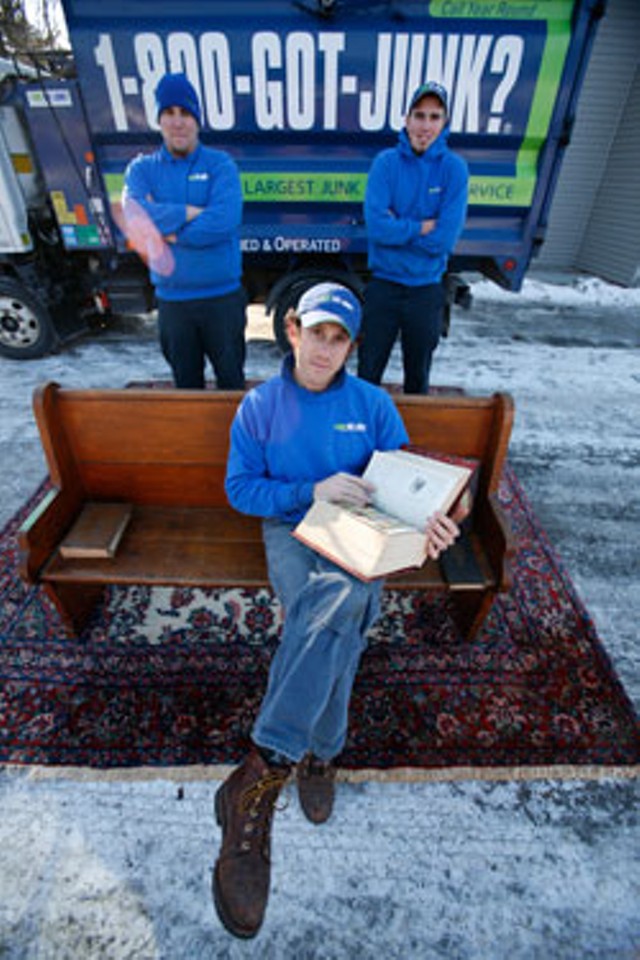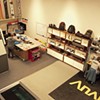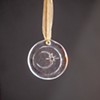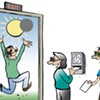Published December 29, 2009 at 12:06 p.m.
Kris Gruen knows how attached people get to their stuff. In his role as a junk hauler for 1-800-GOT-JUNK?, he has played therapist to countless clients who need to get rid of their possessions but can’t bear to see them go. One way Gruen coaxes them into relinquishing things is to promise their treasures won’t be relegated to the landfill but will live on to provide joy to someone else.
This kind of repurposing is rare in the trash-hauling business. It requires not only an eye for hidden gems, but also the time and energy to sort through everything else. Gruen and his boss, Aaron Fastman, who have been friends since childhood, believe the extra effort is worth it. And they’re trying to get other people to see that, too.
The Vancouver-based company 1-800-GOT-JUNK? bills itself as the “world’s largest junk hauler.” It does not bill itself as the “world’s largest repurposer of stuff,” which is what makes the efforts of franchise holder Fastman and Gruen unusual. While other outfits may just truck everything to the nearest landfill, the South Burlington franchise makes it company policy to keep things out of the waste stream.
This entails a belief that most objects can be reused and a willingness to find those new users. In the post-holiday season, when many of us are laden with gifts we don’t want or need, it seems like a lofty ideal.
But the antiwaste policy is also a huge selling point for clients, Gruen says, and it has resulted in some interesting letting-go stories. Recently, the company was called to help move an elderly couple out of a house where they’d lived their entire married lives. Gruen and crew took five truckloads of stuff from the Charlotte home — a tough thing for the couple to witness. Inside the house, the haulers found antique quilts, books and sterling-silver utensils. They managed to find new homes for many of the couple’s valuables.
Another, ongoing client is a Burlington-area woman whose husband passed away. As she becomes emotionally ready to part with his former possessions, she calls 1-800-GOT-JUNK? to take them away. The piecemeal project has taken a year and a half and has yielded many treasures, including World War II-era medical equipment and a huge desk that had to be dismantled to leave the house. During that process, Gruen recalls, the woman’s face looked stricken, yet she was comforted to know that the crew would reassemble the desk for someone else to use.
Fastman, 35, started out in the business solo, recycling as much as he could, but it was about two years ago, when Gruen arrived, that the haulers began to repurpose in earnest. It took a few months, though, for even Gruen to fully appreciate how many things could be put to a new use. “I’m bewildered at how much stuff can be relocated,” he says. “In the beginning, I had no idea what could be saved.”
Here’s how their service works: A client calls up Fastman asking to have the contents of her garage hauled away. When the 1-800-GOT-JUNK? crew arrives, they sort the items based on what goes where. Some stuff can be taken to Restore (formerly the Recycle North resale shop), to the Committee on Temporary Shelter or to Jamba’s Junktiques, all in Burlington. If Gruen thinks a particular piece is appropriate for an antique store, he’ll offer it to a local owner. “People don’t want to waste the time doing it themselves,” Fastman says. “If you load up your truck, you’d have to take it to 10 different places.”
This service is enormously helpful to organizations such as the ReSTORE, which needs donations to continue operating. Milia Bell, marketing manager for Resource (formerly Recycle North), says GOT-JUNK trucks stop by the store at least once a week. It’s the only hauling company that delivers there, she notes. And the ReSTORE staff is grateful. “They kind of give us first pick,” Bell says. “We rely a lot on what they bring in. They’re good community partners.”
While items such as beds, desks and living-room furniture typically end up at ReSTORE, high-value pieces often go to places like Patina in Shelburne or Upstairs Antiques in Burlington. Something quirky but not exactly priceless is ideal for a place like Jamba’s Junktiques, where owner Phinn Sonin — a “gregarious supporter of repurposing,” Gruen says — can turn it into something of value.
Recently, Gruen’s crew took a 300-pound antique sink to Patina’s new owner, Jennifer Blanchard. She wasn’t sure what she’d use it for but bought it anyway, for $50. A customer wanted to buy the sink, but Blanchard eventually decided to keep it herself; the piece is now used to display handmade Portuguese soaps.
That interaction was Blanchard’s first with 1-800-GOT-JUNK?, though Patina’s previous owner had told her the haulers often found items for the antique dealer. She was impressed with Gruen’s knack for turning up treasures in unlikely places. “Kris has the eye. He seems like a very cultivated young man,” Blanchard says.
All this repurposing isn’t about making a buck. Fastman says the company sees its cash at the front end, when people hire a truck and a crew. When businesses such as Patina pay for items, that money goes into a fund for GOT-JUNK’s newest endeavor: an educational program that teaches local students about the value of things. The program, called “JunkWise: What we can learn from caring for yesterday’s favorite things,” has already been presented at a number of Burlington city schools.
While computers and iPods have plenty of value to today’s kids, Gruen suggests those items can’t tell a human story in the way that, say, a handmade table can. He tells students that maps, letters, even something like an old church pew, help people understand where they came from. “It keeps the value of place alive,” Gruen says.
The goal of the program is to “instill new appreciation for old materials in our lives,” Gruen adds. He and Fastman would like their target audience of 9- to 16-year-olds to understand that we can no longer live in a throwaway culture. Many things are worth saving, even if we no longer want them, Gruen reasons. “We want people to see the potential museum in all of our homes,” he says. “The ancient history of America is buried in its basements.”
More By This Author
About the Artist

Matthew Thorsen
Bio:
Matthew Thorsen was a photographer for Seven Days 1995-2018. Read all about his life and work here.
Matthew Thorsen was a photographer for Seven Days 1995-2018. Read all about his life and work here.
Speaking of...
-

Regulators Are Poised to Let Vermont Gas Buy Methane From a Distant Landfill
Oct 21, 2022 -

Video: Talking Trees With Burlington Arborists
May 5, 2022 -

Increasing Downpours Impede Efforts to Improve Lake Champlain's Water Quality
Aug 18, 2021 -

Vermont Senate Blocks Governor's Act 250 Reform Order
Feb 4, 2021 -

Scott's Executive Order to Update Act 250 Draws Fire
Jan 21, 2021 - More »
Comments
Comments are closed.
From 2014-2020, Seven Days allowed readers to comment on all stories posted on our website. While we've appreciated the suggestions and insights, right now Seven Days is prioritizing our core mission — producing high-quality, responsible local journalism — over moderating online debates between readers.
To criticize, correct or praise our reporting, please send us a letter to the editor or send us a tip. We’ll check it out and report the results.
Online comments may return when we have better tech tools for managing them. Thanks for reading.














































